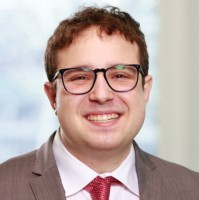April is Autism Acceptance Month. During this time we recognize the importance of creating an inclusive society that values neurodiversity, and the benefit that all of us have when we can bring our whole selves to school, work and our community. In this month’s blog, Jonathan Kratchman talks about how being autistic has been a challenge and a benefit in his personal and professional life.
Neurodivergently Yours

by Jonathan Kratchman
I never imagined myself to be where I am today. Growing up, I was told that I would never go to college, live on my own, or have the job I desired. I was meant to graduate high school at 21, yet by that time, I was well into my junior year of college as an honors student. Being diagnosed autistic, many people had extremely low expectations for me, however, I was able to not just meet those expectations but also exceed them. I have had the opportunity to be successful not because I have “overcome” autism, but because I have learned to utilize the strengths of being autistic to my advantage and learn and improve more in areas in which my autism, in particular, challenges me to create a better balance.
Even before being told I was autistic, I knew as early as preschool that I was different
Even before being told I was autistic, I knew as early as preschool that I was different. When I was 3 years old, I did not speak. I remember my parents taking me from doctor to doctor seeking answers for my lack of speech. I began to learn to speak through intensive speech and occupational therapy, I was in special education for most of my time from preschool through graduating high school but always knew that I was different because of my treatment at school compared to my neurotypical peers. Even though I had been diagnosed before starting speech therapy, it was not until I was 10 years old when I was told I was autistic. After so much time, I finally had an answer as to why I was different.
Although I knew being autistic meant I was different from my peers, I did not always know what being autistic meant for me. When I was younger, I was often ashamed of myself and struggled very much with self-esteem. I was often stressed and would easily experience meltdowns throughout my time in elementary and middle school. These behaviors separated me from my peers, which further damaged my self-esteem. It was only just a year ago that I learned this is normal for autistics and that there is a formal term for this experience, “burnout”.
Growing up, I was told to hide a lot of my emotions inside with fear of a negative consequence through a common approach used on autistic individuals known as Applied Behavioral Analysis (ABA). In preschool, that meant unusual and awkward discipline such as seclusion or having the teacher dump a whole jar of coins on the floor intentionally for me to pick up. In elementary and middle school, those consequences meant the loss of “points” based on behavior that people did not see as acceptable such as checking a clock, or doodling in my school books, or not effectively regulating my emotions in an attempt to get me suppress traits that are considered to be autistic. For many, this could be forcing yourself to make eye contact with someone or keeping your hands still and in one place. These traits are different for each individual, but can vary from making hand movements, talking to yourself out of nowhere, grinding your teeth, twiddling your thumb, or making movements with your face. Hiding these traits is not a skill all autistics carry, but some believe is necessary for a lot of us to succeed because of the perception that the natural autistic traits go against societal norms. For example, if I was fidgeting while talking, you would perceive that I am not interested in the conversation. On the contrary, for me, this is not true, rather the fidgeting is a mechanism I use to feel more comfortable and welcomed. Unfortunately, the process in which I was trained focused on autistics accommodating for neurotypical society through “masking” or hiding my autistic self. Instead of society being accommodating and inclusive of autistic people. This process and the ideas behind it have been present in just about all social settings in which I have been present — from a casual conversation, to a date, to an interview.
Growing up, I was told to hide a lot of my emotions inside
Masking was a significant focus of my grade school training so Rutgers University was the first time I was truly integrated in settings dominated by neurotypical people. Like most students, I dealt with a few challenges with adjusting to college. The biggest one for me was the self-advocacy that is required by people with disabilities on a college campus. In grade school, all of my accommodations were planned out for me in consultation with a team including my parents, teachers, and school administrators. Suddenly as a college student, it was my responsibility to ask for accommodations through the disability services offices, make sure they were approved, and then discuss them with each individual professor. I was unprepared for this and found the individual engagements intimidating. I am grateful however that I was in a college support program for Autistic students which gave me a leg up on learning this level of self-advocacy and helped me replicate it on my own in the future. I took my program staff to go with me to one professor’s meeting and from there; I knew everything I needed to do in order to advocate for myself with professors.
I thought many of those challenges in college would be unique to me as an autistic, but after talking with friends and mentors, I realized that these challenges were common amongst many college students. Over

The Eagleton Institute occupies Wood Lawn Mansion and its Carriage House, located on the Douglass Campus at Rutgers-New Brunswick.
time, I was able to succeed by working with the resources Rutgers provided along with the support of friends and mentors and my drive to always achieve more. Through hard work and perseverance, I was admitted into the honors program and flourished in my undergraduate career. Once I found and created tools and resources that worked for me, I realized that being autistic was not preventing me from achieving these milestones, but was in fact a part of the skills that I had in helping me achieve many of these moments.
As I was nearing the end of college, I realized that I needed to find a job. One aspect many autistic people struggle with is networking and job interviews. In these situations autistic people can have difficulty due to societal norms about eye contact or fidgeting when talking. These norms also contribute to the high unemployment rate amongst autistics as both of these situations can and are used to filter out candidates of varying abilities including autistic candidates.
After applying, interviewing, and ultimately receiving mountains of rejection emails, I was demoralized, but I never gave up hope that I would find an opportunity that would work out for me. Eventually, I got an email from a friend advertising an internship for people with disabilities at Anthem. I applied and heard back about a phone interview about a month later. After two phone interviews and a few days, I had paid employment.
The Disability Policy Engagement Internship at Anthem was really the turning point in which I developed my autistic identity. For the first time I was in a professional setting in which disability and neurodiversity was viewed with value and my identity as an autistic person was not asked to be hidden. I worked alongside disability rights leaders on the National Advisory Board (NAB), leaders at Anthem and in the community. I was able to also attend events supporting the disability community such as the Association for Persons Supporting Employment First, the National Council on Independent Living, the American Association for People with Disabilities, and the Autism Society. These experiences have helped me understand my place in the disability community and further define my autistic identity.
After my internship, I accepted a position at Anthem, within HealthCore as a policy analyst. In my current role, I use my strengths amplified by autism to provide my team with a one-of-a-kind perspective. When I do my work, I look towards the sources I am familiar with and much of my team is not and towards the sources my team is familiar with but I am not. With that, my team is able to get different perspectives in their research and I am able to learn more perspectives in my own development.
Many people will tell me that I have overcome my disability, yet that simply is not true. Instead, I have learned to accept and be proud of being autistic. I still deal with burnout and the need to mask. The  difference now from when I was in school is that I am better prepared to engage in a world that is still learning about the best ways to include neurodiversity as core values. I decide when to suppress the traits which would call me out as autistic to someone who would not know me, or when to bring my full self to the table. When I return to my apartment after a stressful day at work, a date gone wrong, a long trip, dealing with the stress of pushing through the crowds on the Metro, or just from masking This is the reality for many fellow autistics. If the world was more accommodating and accepting of us, there would be less instances of burnout, less instances of added stress, and less of a stigma around autistics.
difference now from when I was in school is that I am better prepared to engage in a world that is still learning about the best ways to include neurodiversity as core values. I decide when to suppress the traits which would call me out as autistic to someone who would not know me, or when to bring my full self to the table. When I return to my apartment after a stressful day at work, a date gone wrong, a long trip, dealing with the stress of pushing through the crowds on the Metro, or just from masking This is the reality for many fellow autistics. If the world was more accommodating and accepting of us, there would be less instances of burnout, less instances of added stress, and less of a stigma around autistics.
Many people will tell me that I have overcome my disability, yet that simply is not true. Instead, I have learned to accept and be proud of being autistic.
Quoting teenage Climate Activist and TIME Magazine’s Person of the Year Greta Thunberg, “Autism is not a ‘gift’. For most, it is an endless fight against schools, workplaces, and bullies. But under the right circumstances, given the right adjustments it CAN be a superpower. Our societies need to change, and we need people who can think outside the box and we need to start taking care of each other. And embrace our differences.” I would not be where I am today without the many people supporting me in life and for accepting me for who I am. If those people did not accept me, I would not accept myself. I would not be here today at HealthCore contributing to health research and policy. At the same time, there are people in my life who want me to change. Point blank, I am who I am. There is always is something for me to learn, but if you want me to change myself, that simply is not happening. I challenge you the reader to think if your practices are accepting of autistics or trying to change us. If you are accepting, that is great. If you are looking to change us, maybe you should look at changing your assumptions of autistics.
Jonathan Kratchman is a Policy Analyst at HeatlhCore Inc. and a graduate of Rutgers University and the Eagleton Institute of Politics Undergraduate Associates Program.


